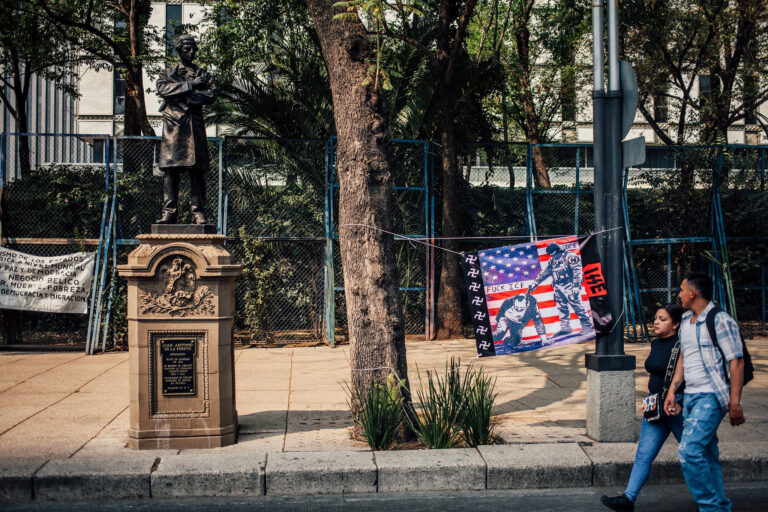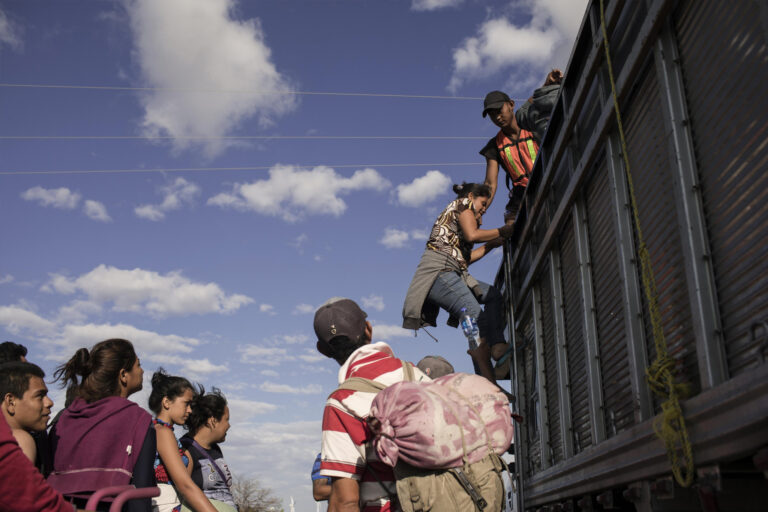People’s Mañanera June 24
Every day, President Claudia Sheinbaum gives a morning presidential press conference and Mexico Solidarity Media posts English language summaries, translated by Mexico Solidarity’s Pedro Gellert Frank. Previous press conference summaries are available here.
Progress of the Program Addressing the Causes of Violence
Arturo Medina, Deputy Minister for Human Rights, Population, and Migration at the Ministry of the Interior, presented the following updates:
• 2,355 peace-building events held with sports and cultural activities.
• 409,000 young people enrolled in the “Youth Building the Future” program.
• 131,083 door-to-door visits conducted.
Public Security Results
Minister of Security and Citizen Protection Omar García Harfuch reported on public security results from June 10 to 22:
• 1,233 suspects arrested for high-impact crimes.
• 671 firearms seized.
• 7,981 kilograms of drugs confiscated.
• 1,893,300 liters of stolen fuel impounded.
Legal Reforms in Public Security
Ernestina Godoy, head of the Presidential Judicial Advisory Counsel, presented the reforms proposed to public security regulations:
National Security Investigation and Intelligence System Law
• Establishes and regulates a system to prevent, halt, and neutralize threats against public peace and fundamental rights.
• Promotes effective collaboration among intelligence bodies of the National Intelligence System and authorities of the three levels of government – federal, state, and local.
• Ensures the protection of privacy and personal data, with judicial authorization required for any action.
Reforms to the National Guard
• Defines the National Guard as a professional, permanent public security force, structured similarly to the Army and Air Force.
• Establishes its cooperation with other public security agencies to obtain, share and generate information on crime prevention and prosecution, under prosecutorial oversight.
Strengthening the National Public Security System
Marcela Figueroa, head of the Executive Secretariat of the National Public Security System, reported:
• The main goal is to strengthen the National Public Security System.
• System structures and procedures to be defined and made more flexible and better coordinated.
Clarification on National Guard Reform and Elective Office
President Claudia Sheinbaum responded to criticism of the National Guard reform. She clarified that members of the NG running for public office must comply with the 1917 Constitutional Article, which states that candidates “should not be in active service in the federal army nor hold command in police or rural gendarmerie in the district where the election is held for at least ninety days before the election.”
Criticism of the INE for Double Standards and Overspending
Sheinbaum criticized what she described as hypocrisy from right-wing sectors regarding alleged internal sabotage in the National Electoral Institute (INE) during the judicial elections. She indicated that the INE overstepped its authority by offering its opinion on the validity of the vote, a task that corresponds to the Electoral Tribunal. In addition, she accused some INE board members of acting on the basis of their own political inclinations against the public’s will and recalled the INE’s excessive spending on the elections.
Measuring Poverty and the Dissolution of CONEVAL
Sheinbaum denied claims that the government intends to stop measuring poverty following the dissolution of the National Council for the Evaluation of Social Development Policy (CONEVAL). She explained that the CONEVAL’s functions will be absorbed by the National Statistical Institute (INEGI), a well-established and reputable agency.
Weinberg and Genaro García Luna Case
The President reported that members of the Weinberg family, linked to the Genaro García Luna corruption network, are negotiating to reach an agreement to provide information and assets. If no agreement is reached, the trial will proceed.
Sheinbaum: No Censorship—Combatting Cyber-Harassment and Gender-Based Violence
The President reaffirmed the government’s commitment to freedom of expression, in light of two recent cases involving allegations of censorship:
- Puebla Case – Anti-Cyber-Harassment Law
Sheinbaum explained that the bill presented in Puebla aims to penalize cyber-harassment, not political speech. However, some political forces have taken advantage of the issue to raise the specter of censorship. She noted that similar laws already exist in Nuevo León and Coahuila without curbing free expression. - Campeche Case – Attacks on Governor Layda Sansores
President Sheinbaum charged that many of the online attacks in social media against Campeche Governor Layda Sansores represent gender-based violence, not just political criticism. She said many of the attacks are misogynistic, centered on the Governor’s physical appearance, which is unacceptable.
Sheinbaum emphasized that the greatest possible freedom of expression exists in Mexico and rejected attempts to manipulate these cases as examples of censorship. She emphasized that “I am always in favor of freedom of expression. People can say and write whatever they want. Where’s the censorship?”
-
CNTE Announces 72 Hour National Strike & March to Mexico City’s Zócalo
The class-conscious teachers union will also make “courtesy visits” to the embassies of countries who committed atrocities against Iran, to show their rejection of US imperialism.
-
Yet Another Mexican Citizen Dies in ICE Custody
The unidentified victim is the 9th Mexican citizen to have been killed in ICE detention since the beginning of 2025; this time in Adelanto, California.
-
Let’s Talk About Migration: Trumpist Persection
Millions of women who have endured unspeakable violence on their migration journey are now being persecuted in the United States by an extremely xenophobic and misogynistic government, led by Donald Trump,




